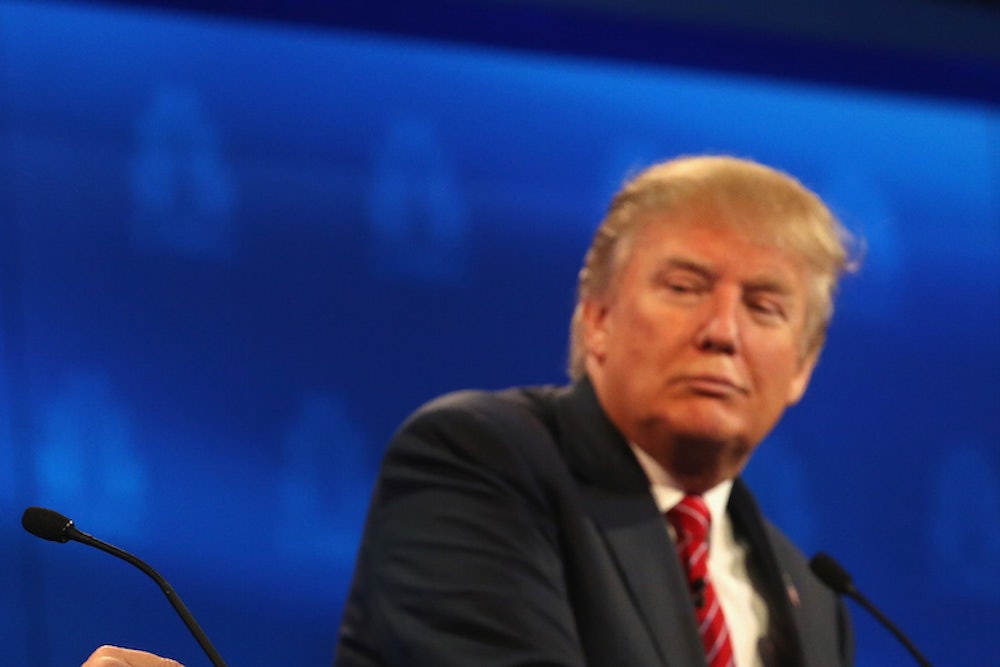From beginning to end, the third Republican debate had an air of unreality. Faced with two hours' worth of uncomfortable questions about their economic policy positions, the candidates could respond only by finding one way after another to cocoon themselves from the truth.
As I wrote before the debate, the debate on CNBC could have—and should have—been an opportunity for the candidates to roll out some tangible, realistic policies targeted to help working- and middle-class Americans, and to counter the 2016 Democrats' laundry list of proposals geared toward working families. Aside from a brief exchange on education reform, that just didn't happen. Instead, what stood out was the candidates' refusal to own up to the details of the one policy they have embraced as an economic panacea for all Americans: Huge, deficit-busting tax cuts that disproportionately benefit the wealthy over ordinary Americans—the same supply-side logic that informed George W. Bush's economic policy.
So the candidates spent the night in a defensive crouch on some of the most detailed—and least realistic—proposals they're campaigning on. CNBC moderator John Harwood first tried to get Donald Trump to confront the fanciful thinking undergirding his $12 trillion tax plan, citing economic experts across the political spectrum who've discredited his assertion that his huge (sorry: HUUGE) tax cuts would somehow pay for themselves. “They said you have as good a chance of cutting taxes that much without increasing the deficit as you would of flying away from that podium by flapping your arms,” Harwood quipped.
Trump essentially asserted that he could, in fact, fly. “Then you have to get rid of Larry Kudlow, who sits on your panel, who's a great guy, who came out the other day and said, I love Trump's tax plan,” he told Harwood. (Indeed, Kudlow is equally untethered to reality in his pre-debate embrace of Trump’s tax logic.) Harwood attempted to press Trump further on the price tag of his plan, which the conservative Tax Foundation says would cost $8 trillion even if you took into account the potential effect the cuts would have on economic growth. Harwood’s co-moderators cut off the exchange before Trump could respond—only to segue into another futile attempt to confront a leading GOP candidate with the actual math of his tax plan.
CNBC moderator Becky Quick told Ben Carson that imposing the ten percent flat tax he’s embraced would mean putting the government in a $2 trillion hole—the Citizens for Tax Justice has a similar analysis. When Carson said a 15 percent flat tax is closer to his ideal, she responded that would still mean a $1.1 trillion hole, given how little tax revenue it would raise. Carson first tried to revert to trickle-down talk. But when Quick told him his flat rate would necessitate a whopping 40 percent cut in the federal budget, Carson simply went into denial. “That’s not true,” Carson said. “That is true," Quick replied. "I looked at the numbers." But Carson didn’t budge.
The award for smartest and most deceptive dodge of the night goes to Marco Rubio. Harwood pointed out that, according to the Tax Foundation, Rubio’s plan would give “nearly twice as much gain in after-tax income to the top one percent as to people in the people in the middle of the income scale.” That is true, even under the most generous assumptions the conservative think tank makes: Under Rubio’s plan, the top one percent gains about 28 percent in after-tax income, including dynamic effects; the middle 40 to 50 percent sees just a 16 percent increase.
Rubio flat out denied this: “You’re wrong, in fact the largest after-tax gains is for people at the lower end of the tax spectrum under my plan." When Harwood tried to interrupt, Rubio simply retorted that it wasn’t the first time the moderator had the facts wrong. “You had a story on it and you had to go back and correct it,” he said. "No, I did not," Harwood answered. "You did. No, you did," Rubio insisted. But unlike the other GOP candidates, Rubio did endeavor to explain exactly why Harwood had gotten his numbers wrong, suggesting that he was looking at the absolute numbers instead of percentage increases. “The math is, five percent of a million is a lot more than five percent of a thousand,” he explained.
Rubio’s dodge was the most effective because it contained a degree of truth. In the analysis that Harwood cited, the poorest 10 percent of Americans would see a far greater percentage change in after-tax income than the top one percent, with an estimated 56 percent bump under Rubio’s plan. That’s because Rubio’s plan also includes changes like a new child tax credit that would help lower-income families. But outside of the very poorest Americans, Rubio's plan would still benefit the one percent more than everyone else on the income spectrum. That's largely because it eliminates capital gains, dividends, and estate taxes entirely, disproportionately benefit the very wealthiest. (The caveat here is there isn't a good benchmark for the Tax Foundation's analysis; less ideological experts like the Tax Policy Center say Rubio hasn't given enough details to even properly analyze the plan's impact.)
Rubio, however, proved himself expert in turning a tough question to his advantage, misleading his supporters into believing that he was completely right and Harwood was completely wrong. On social media during the debate, conservatives circulated a tweet from October 14 in which Harwood had corrected himself on the Tax Foundation's analysis of Rubio’s plan for the bottom 10 percent and top one percent, which may have been what Rubio was referring to. That correction had no bearing on Harwood’s question to Rubio about his plan’s benefits for the middle class. But it proved to be excellent red meat for conservatives who seemed more eager to gang up on the debate moderators and the media than face the cold, hard facts about the Republican candidates' policies.
